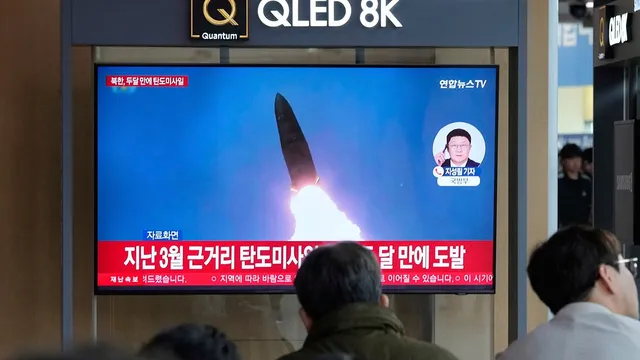
North Korea escalates tensions by firing ballistic missiles towards East Sea
2025-05-09 00:17- On May 8, 2025, North Korea launched several ballistic missiles towards its eastern waters.
- South Korea’s military reported that these missiles were likely short-range and increased scrutiny has been placed on North Korean military activities.
- This incident reflects escalating tensions on the Korean Peninsula and alignment with Russia amid ongoing global conflicts.
Express your sentiment!
Insights
On May 8, 2025, North Korea conducted a series of ballistic missile launches towards its eastern waters. The South Korean military confirmed the events took place in the morning, shortly after 8 a.m. local time, in an area near the eastern port city of Wonsan. Although South Korea’s Joint Chiefs of Staff did not provide specific details regarding the missiles' range or trajectory, they were presumed to be short-range ballistic missiles. This marked North Korea's first known ballistic activity since March 10, during which time increased military tensions were already present on the Korean Peninsula. The recent missile launch added to a series of weapons tests by North Korea, which have raised tensions not only in the region but also globally. The South Korean military emphasized that they bolstered surveillance measures and shared launch information with the United States and Japan to ensure they were prepared for any potential threats emanating from North Korea. These ongoing military activities correlate with North Korean leader Kim Jong Un's persistent focus on accelerating the development of the nation’s nuclear and missile capabilities. Additionally, this missile launch followed an announcement from North Korean state media in the previous days, in which Kim Jong Un encouraged munition workers to increase production of artillery shells. This directive comes amid reports of North Korea's military assistance to Russia during the ongoing conflict with Ukraine. In a notable shift, North Korea acknowledged that it had sent combat troops to aid Russian forces in reclaiming territory in the Kursk region, a fact that they had previously denied. As regional tensions simmer, the militaristic posturing from North Korea represents a clearer alignment with Russia, which raises concerns among South Korea, Japan, and the United States. The collaborative military exercises between the U.S. and South Korea have already been met with complaints from Pyongyang, indicating that future tensions may escalate further as North Korea continues to assert its influence in the region. The international community remains watchful as Kim Jong Un’s regime shows no signs of halting its aggressive testing and rhetoric surrounding military capabilities.
Contexts
The impact of North Korea's missile tests on regional security remains a pressing concern for neighboring countries and the international community. These tests have continued to escalate tensions, prompting responses from countries such as South Korea, Japan, and the United States. North Korea's missile program development, including advancements in technology and range, has instilled fear and uncertainty in the region, challenging the existing security framework established after the Cold War and demanding a reassessment of defense strategies by its neighbors. The frequent missile launches not only signify North Korea's ambitions to enhance its military capabilities but also express its dissatisfaction with perceived threats from the international community, further complicating diplomatic efforts to mitigate conflicts. In response to North Korea's missile activities, regional players have sought to bolster their defensive measures and capabilities. South Korea has pursued improved missile defense systems and increased military joint exercises with the United States to demonstrate its commitment to counter any potential aggression. Japan, similarly concerned about its security, has expanded its defense posture and enhanced cooperation with allies to ensure preparedness against North Korean threats. This intensification of military preparedness on the part of these nations has implications for regional dynamics; it can lead to an arms race and heightened tensions, making diplomatic resolutions increasingly difficult. Moreover, the broader implications of North Korea's missile tests extend beyond immediate regional security concerns. The tests have raised alarms within the context of international non-proliferation efforts. They challenge United Nations Security Council resolutions and undermine diplomatic agreements aimed at curbing North Korea's nuclear ambitions. As North Korea continues to assert its military prowess through these tests, it complicates the efforts of various nations striving to achieve denuclearization and maintain peace within the Korean Peninsula. Consequently, the risk of miscommunication or miscalculation in light of escalating military posturing has increased significantly, further endangering stability in the region. Ultimately, the situation necessitates a coordinated and comprehensive strategy involving not only regional stakeholders but also global powers engaged in diplomacy and conflict resolution. Open dialogue, confidence-building measures, and engagement in negotiations could play pivotal roles in easing tensions and addressing the underlying security dilemmas. Nonetheless, as long as North Korea persists with its missile programs, the prospect of enduring peace and stability in the region remains elusive, requiring constant vigilance and proactive approaches from all parties involved.